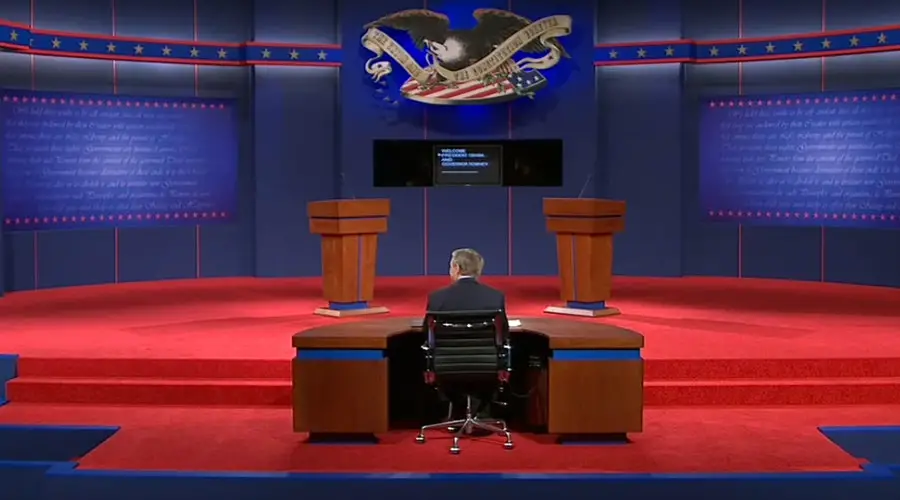Will the debates matter? Well, according to the Guardian, “It is being described as the political equivalent of the Super Bowl, World Cup final and Rumble in the Jungle rolled into one. According to the NY Post, “The 9 p.m. showdown could pull in record ratings on television. ‘It could be bigger than the Super Bowl,’ said political consultant Susan del Percio. The last Super Bowl drew 112 million viewers.”
Care enough to put money on it? If you go to the betting site, PredictIt, you’ll see that they’re currently betting 96 cents (out of a dollar) that there will be a debate, 58 cents that it will be the most watched debate in US history, and 91 cents that there won’t be a third-party candidate on-stage. They’re betting 77 cents that Trump will participate, and 48 cents that he’ll use the term, “Crooked Hillary.” Meanwhile, they’re betting 37 cents that the moderator will ask about Benghazi, 36 cents that he’ll ask about “deplorables, “ and only 21 cents that he’ll ask about “pneumonia.”
Newsday disagrees that the debate will be as important as people think.
Once, debates were a showcase for candidates, an introduction to a nationwide viewing audience. Now, in a modern world of 24-hour news coverage, Twitter, Facebook, YouTube and smartphones, debates don’t carry the same weight as decades ago, analysts said.
“Generally speaking, preferences between the two major candidates move only a few points, at most, in the closing three months of a campaign,” said Samuel Wang, professor of neuroscience at Princeton University and founder of the Princeton Election Consortium, which tracks polling and elections.
Barring something unforeseen and dramatic in 2016, Wang said, the “odds of a debate making a big enough difference to change the outcome are one in 10.”
But this year may be different. According to an ABC News/SSRS poll, 74% of those surveyed said they were “likely” to watch the presidential debates this year, and a full one-fourth say “the candidates’ performances in the upcoming presidential debates may have a major impact on their vote in the November election.”
The three presidential debates this fall will probably be unlike anything we have seen before. Although commentators like to speak in hyperbole, in 2016 they could be right.
The reason is clear. American politics has not seen anything like Donald Trump. If his performances in the Republican primaries are any indication of what is to come, the verbal battles between him and Hillary Clinton will be intense, dramatic and contentious. Trump will certainly approach these events like a reality game show, hoping he is the last person left standing.
Vox says this is a year like no other, according to Andrew Prokop.
The evidence isn’t entirely conclusive, but in my read of it, debates have the potential to make a small but real impact on the race. Polls have often shifted by a few percentage points during debate season, and in a close race, that could really matter. . .
Political scientist John Sides had a good, thorough rundown of the relevant evidence in 2012, and he found that many supposed game-changing debate moments had a relatively minor impact, if any.
The data shows overall that big changes in the polls during debate season just haven’t happened in recent decades — but it also shows that small changes, of a few percentage points or so, are common. . .
Still, some effects are pretty clearly from the debates themselves — as in 2012, when President Obama’s 4 point lead in the polls abruptly vanished after what was judged as a weak performance in his first debate against Mitt Romney. Obama regained a bit of ground after subsequent debates, but polls showed a very tight race from then on out.
How the commentators interpret the debates could also make a difference.
Kim Fridkin and several co-authors at Arizona State University conducted an experiment around a 2004 debate between George W. Bush and John Kerry. They screened the debate alone for one group of people, they showed the debate plus 20 minutes of NBC commentary to another group, and they showed the debate plus commentary on CNN.com for third group.
Overall, participants who watched the debate alone, or watched it and read CNN.com commentary, were more likely to think Kerry won. But participants who watched the debate plus NBC’s analysis afterward were overwhelmingly likely to conclude Bush was the winner.
The good news is that it will be easy to find the debate, if you want to watch.
So the good news for viewers, especially undecided voters (who are you, anyhow??) is that tuning into the first debate will be easy for anyone with cable or an internet connection. According to the Latin Post, major cable news channels, including CNN, Fox News, and MSNBC, will carry live coverage of each of the debates. They’ll also be broadcast on C-SPAN, ABC, CBS, and FOX. CNN has live-streamed the primary debates in the past, and is likely to do it again.
The debates are a great indicator of how the respective candidates perform under pressure and how well they understand foreign and domestic policy and the many, many issues the nation is facing that the next president will have to address. There’s less than two months until Election Day, Nov. 8, so tune in.
Related: Full Details of the First Presidential Debate on Sept. 26
Donate Now to Support Election Central
- Help defend independent journalism
- Directly support this website and our efforts
